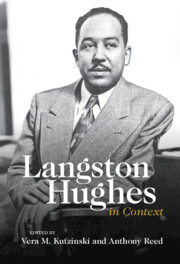Introduction
Langston Hughes in Context
Published online by Cambridge University Press: 10 November 2022
Summary
From his emergence during the Harlem Renaissance, James Mercer Langston Hughes (1902–67) embodied the contradictions and promise of black life and art in the twentieth century. Born in Joplin, Missouri, Hughes established himself as the “Poet Laureate of the Negro Race” with The Weary Blues (1926). But “the Negro Race” was never bound by one nation, and geographies in Hughes’s work are always sites of crossing, migration, immigration, and emigration. His reception bears this out. Early on, Hughes – arguably the most influential writer among his Harlem Renaissance peers – established an enduring reputation in the United States and abroad through his poetry, prose, drama, and their translations. By the time he graduated from Lincoln University in 1929, he had already published a second volume of poetry, Fine Clothes to the Jew (1927), and he had visited West Africa, France, and Italy. Extended trips to Haiti, Cuba, the Soviet Union, and Spain followed, and with them versions of his poems in many languages.
- Type
- Chapter
- Information
- Langston Hughes in Context , pp. 1 - 8Publisher: Cambridge University PressPrint publication year: 2022

